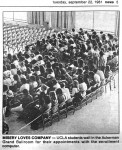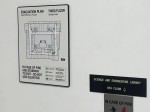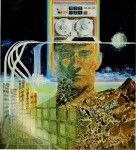Our recent complaints of increasing enrollment echo issues in decades past
Author Archives: Keshav Tadimeti
Keshav Tadimeti: Napolitano’s tirade on free speech unjustified, insensitive
In the shouting match that is democracy, if your voice is louder than someone else’s, you aren’t silencing theirs; you’re just heard better. That’s a fact Janet Napolitano doesn’t seem to understand. Napolitano, the President of the University of California, recently published an op-ed in the Boston Globe – as opposed to, say, a publication […]
Keshav Tadimeti: UCLA must implement preemptive stringent cybersecurity measures
You would have to be a yahoo to still be using Yahoo. And this time, that’s not just because Gmail is superior. If you haven’t heard, Yahoo announced last week there was a massive security breach of its servers, resulting in hackers stealing email account information for over 500 million users. In other words, there’s […]
Throwback Thursday: The ordeal of registering for classes in the days before MyUCLA
The last time I sat in a chair for two hours waiting for my name to be called was at my middle school graduation. But for UCLA students 35 years ago, that was a regular occasion when signing up for classes. According to a Daily Bruin news article published Sept. 22, 1981, UCLA students used […]
Keshav Tadimeti: Administration should improve communication with undergraduates
For the record, in my one year at UCLA I have only ever seen one of the Murphy Hall tenants in person. Actually, make that two: I not only had the good fortune of listening to Vice Chancellor Jerry Kang during the fall 2015 Diversity Caucus, but I also got to witness Chancellor Gene Block […]
Lost in Boelter: Finding a way out
Communication is key in computer science. That may seem apparent when we’re talking about machines – networks are, after all, built off of communication between routers and computer systems. However, it’s also true when we’re talking about the field itself. Whether it is communication between software engineers and entrepreneurs or developers and project managers, communication […]
Lost in Boelter: Speaking the pseudo-language
One of the lesser–known skills computer science students pick up in college is the ability to create pseudo-languages. I’m not talking about coding languages, but systems of interpretation, where certain words and phrases map to particular meanings. These pseudo-languages aren’t spoken, but reveal themselves in almost every part of the field, such as in network […]






